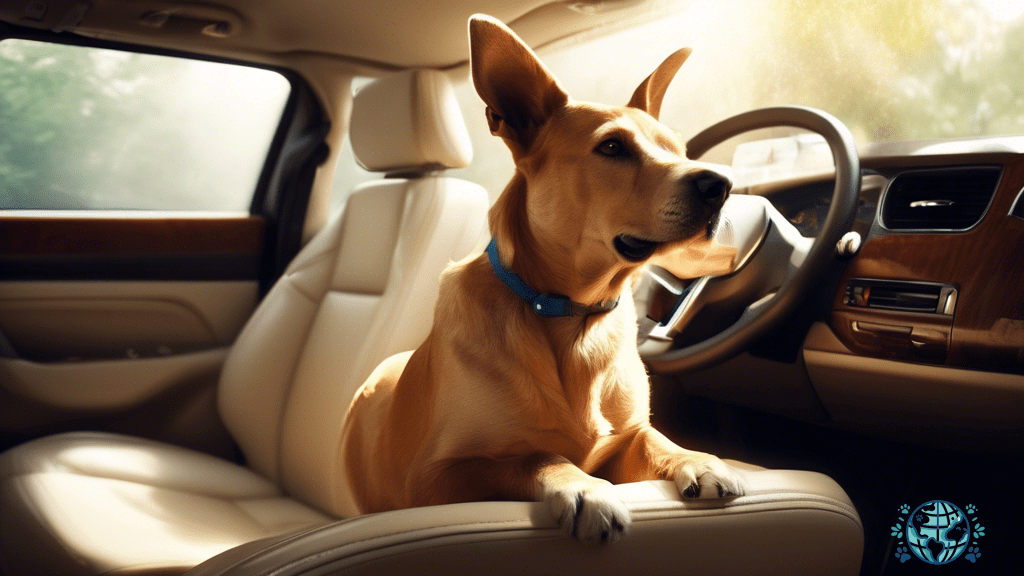Are you planning a road trip with your furry friend? Well, buckle up, because we’re about to embark on a journey to prevent and treat pet travel motion sickness!
Picture this: you and your beloved pet cruising down the highway, wind in your hair and a smile on your face. But suddenly, your pet starts looking queasy, their eyes widen, and you both know what’s coming next. It’s pet travel motion sickness, and it’s about as fun as a car ride with a backseat driver.
But fear not, because we’ve got the tips and tricks to keep your pet’s tummy happy and their tail wagging throughout your entire adventure.
Before we hit the road, it’s important to recognize the symptoms of pet travel motion sickness. Keep an eye out for excessive drooling, vomiting, whining, or even lip licking. If your pet starts showing these signs, it’s a clear indication that they’re not enjoying the ride as much as you are.
To prepare your pet for travel, start by taking them on short car rides to get them accustomed to the sensation of being in a moving vehicle. Gradually increase the duration of these trips to build up their tolerance. Additionally, make sure your pet has an empty stomach before hitting the road, but don’t forget to provide them with plenty of water to stay hydrated.
And don’t worry, we’ll dive into some natural remedies and treatment options later on to help ease their motion sickness woes. So get ready to say goodbye to pet travel motion sickness and hello to a smoother, happier journey!
Key Takeaways
- Familiarize your pet with car rides by starting with short trips and gradually increasing the duration.
- Create a comfortable environment for your pet during travel, using familiar bedding and toys.
- Use natural remedies like ginger and peppermint to help alleviate symptoms of motion sickness.
- Consult with a veterinarian for treatment options such as anti-nausea medications or calming supplements.
Recognizing the Symptoms of Pet Travel Motion Sickness
Just like how a roller coaster can make your stomach churn with excitement, pet travel motion sickness can make your furry friend feel nauseous and uneasy. It’s like they’ve become the star of their very own horror movie, with their stomach doing somersaults and their face turning a lovely shade of green.
You might notice your pet drooling excessively, panting heavily, or even vomiting during car rides. It’s not the most pleasant sight, but hey, at least they’re not projectile vomiting like Linda from accounting after the office Christmas party.
But seriously, it’s important to recognize these symptoms so you can help your pet feel better and make their travel experience more enjoyable. Keep an eye out for signs of anxiety, such as trembling or whining, as these can be indicators of motion sickness too.
And let’s be honest, nobody wants their pet to be more anxious than a contestant on a cooking show trying to impress Gordon Ramsay. So pay attention to their behavior and consult with a veterinarian if you suspect your furry friend is suffering from motion sickness.
Preparing Your Pet for Travel
Before you embark on your journey, make sure to prepare your furry friend for the trip ahead. Just like humans, pets need to be properly prepared for travel to avoid any discomfort or motion sickness.
Start by getting your pet used to the idea of being in a moving vehicle. Take them on short drives around the neighborhood, gradually increasing the duration of the trips. This will help them become acclimated to the sensation of being in a car and reduce the chances of them getting sick during longer journeys.
Next, make sure your pet is comfortable in their travel crate or carrier. Place familiar bedding and toys inside to create a sense of security. You can even try leaving the carrier open in your home for a few days before the trip, allowing your pet to explore and get accustomed to it.
Additionally, it’s a good idea to feed your pet a light meal a few hours before you leave. This will prevent them from having an empty stomach, which can contribute to motion sickness. Remember, a well-prepared pet is a happy pet, and a happy pet makes for a more enjoyable journey for everyone involved.
So take the time to prepare your furry friend and ensure a smooth and puke-free trip!
Minimizing Stress and Anxiety During Travel
One way to help your furry friend have a more enjoyable journey is by minimizing stress and anxiety during their travels. After all, nobody likes a stressed-out pet.
To keep your pet calm and collected, try playing some soothing music in the car. It’s like a spa day for your pet’s ears! Just make sure to avoid heavy metal or any music that might make them want to start headbanging. We don’t want any accidents on the road!
Another way to ease their anxiety is by creating a comfortable environment in the car. Consider bringing their favorite blanket or toy to make them feel at home. And hey, if they have a security blanket, who are we to judge? We all have our quirks!
You can also try using a pet travel carrier or a seatbelt harness to keep them safe and secure. It’s like a pet-sized seatbelt, because safety first, right?
So, grab their favorite tunes, their blankie, and buckle them up for a stress-free journey. Your pet will thank you, and you’ll have a happier and calmer travel companion by your side.
Natural Remedies for Pet Motion Sickness
There’s a surprising solution to help your furry friend combat those queasy feelings while on the road. You might not believe it, but ginger can be a game-changer for pet motion sickness. Yes, that’s right – ginger! Not only is it a popular spice in your kitchen, but it can also work wonders for your pet’s upset tummy.
So next time you’re planning a road trip with your four-legged companion, make sure to pack some ginger treats or ginger-infused water to keep their stomachs settled. Who knew that the key to a happy and nausea-free journey could be found in your pantry?
But wait, there’s more! Another natural remedy that can work wonders for pet motion sickness is peppermint. Not only does it have a refreshing scent, but it can also help to soothe your pet’s upset stomach. You can try giving your furry friend a small amount of peppermint oil before your trip, or even try rubbing a small amount on their belly. Just be sure to dilute the oil with a carrier oil, like coconut or olive oil, to avoid any irritation.
With the power of ginger and peppermint on your side, you and your pet can conquer those car rides with ease and say goodbye to motion sickness once and for all!
Consulting with a Veterinarian for Treatment Options
When you consult with a veterinarian, they can provide you with various options to alleviate your pet’s discomfort during travel. Whether it’s a prescription medication or a specialized treatment plan, your vet will have you covered.
They might recommend anti-nausea medications like Cerenia or Dramamine, which can help prevent motion sickness in your furry friend. Just imagine your pet, cruising down the highway with the wind in their fur and not a care in the world, thanks to their little pill. It’s like a mini vacation for them!
And hey, if your pet is a bit of a drama queen (or king), your vet might suggest using a calming supplement like CBD oil or a pheromone spray. These little helpers can take the edge off and make the whole travel experience a lot smoother (pun intended).
Now, I know what you’re thinking. "But what if my pet is as stubborn as a mule and refuses to take any kind of medication?" Well, fear not! Your vet has got more tricks up their sleeve.
They might recommend behavior modification techniques, like desensitization or counterconditioning. Basically, it’s all about gradually getting your pet used to the idea of traveling and making it a positive experience for them. You can start by taking them on short car rides, giving them treats and praise along the way. Soon enough, they’ll associate travel with good things and be ready to conquer the open road. It’s like turning your pet into a little travel junkie!
So, don’t hesitate to consult with your vet and explore all the treatment options available. They’re here to help your pet feel like the ultimate road trip superstar!
Frequently Asked Questions
Are there any over-the-counter medications that can be given to pets to prevent motion sickness during travel?
Looking for a solution to your furry friend’s motion sickness during travel? Unfortunately, there are no over-the-counter medications available for pets. But fear not! There are other remedies to help ease their discomfort.
Can motion sickness in pets be a sign of an underlying medical condition?
Yes, motion sickness in pets can sometimes be a sign of an underlying medical condition. It’s always a good idea to consult with your veterinarian if your furry friend is experiencing frequent bouts of queasiness.
Can I take my pet on a long road trip if they have a history of motion sickness?
Sure, go ahead and take your pet on a long road trip! It’ll be a real adventure, watching them puke their guts out and feeling guilty for subjecting them to hours of misery. Fun times!
Are there any specific breeds of dogs or cats that are more prone to motion sickness?
Oh, the dreaded motion sickness! Well, when it comes to specific breeds, some dogs like Bulldogs, Pugs, and Dalmatians are known to be more prone to it. As for cats, Siamese and Burmese kitties may experience it too.
Can motion sickness in pets be prevented through training or conditioning exercises?
You can try training and conditioning exercises to prevent motion sickness in pets. Use positive reinforcement and gradually expose them to car rides, making it a positive experience. Symbolize the journey as a fun adventure!
Last Updated: January 21, 2024
Disclosure: We may receive affiliate compensation for some of the links in this article at no additional cost to you if you decide to purchase a product. You can read our affiliate disclosure in our privacy policy.
Kevin Fairbanks is your go-to guide for all things pet travel. With a passion for adventure and a heartwarming love for his two feline companions, Spooky and Penelope (lovingly known as Nelly), Kevin understands the joys and challenges of exploring the world with furry friends.
As an avid traveler and a nature enthusiast, Kevin is no stranger to the great outdoors. Whether he’s camping under the starry skies or exploring pet-friendly cityscapes, he’s always on the lookout for new experiences to share with pets and pet owners alike.
Kevin’s journey into the world of pet travel was inspired by his beloved Chihuahua, Lola, who recently crossed the Rainbow Bridge. Her memory lives on through the valuable insights and tips he provides to fellow travelers.
Join Kevin as he combines his passion for adventure, love for pets, and wealth of knowledge to help you navigate the exciting world of pet-friendly travel. Whether you’re planning a pet passport adventure or seeking the best cat-friendly lodging, Kevin has you covered.
Follow along with Kevin’s adventures and gain valuable insights into making your pet travel experiences memorable and stress-free.
Verified and Approved by:

Kevin Fairbanks
Head of SEO
Like This Article?
Share with your friends
Table of Contents
Latest Articles
Keep Reading
-
Tropical Getaway: Pet-Friendly Resorts In The Caribbean
Planning a tropical getaway? Check out our list of the best pet-friendly resorts in the Caribbean to bring your furry friend along for an unforgettable adventure! Start packing and make memories with your pet today.
-
Top Pet-Friendly Beach Resorts For A Pawsome Vacation
Looking for the perfect pet-friendly beach resorts? Check out our list of top destinations where your furry friend can enjoy sun and sand. Click now to plan a pawsome vacation!
-
Feeding Your Pet Right: Nutrition Tips For Travel
Ensure your pet stays healthy and happy while traveling with these expert nutrition tips. Click now to learn how to provide the best pet travel nutrition and keep your furry friend thriving on the go!




